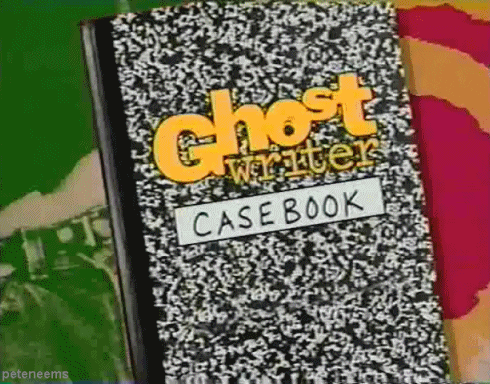So you want to teach kids how to be the friendly neighborhood ghost? As much as we'd all hate to say it, giving away the credit to your work is not always a bad thing, especially when it comes to its learning benefits. Sadly, ghostwriting gets tossed around quite a bit with the likes of plagiarism and dishonesty. Quite frankly, that is more like comparing cranberry sauce to sliced beets. One is sweet, and the other, well, leads to bitter outcomes in life. Choosing to mistake ghostwriting as a bitter beet discards the amazing benefits one can grasp from it. Truly, there are some folks who use ghost writing for bad, but that does not account for the majority. Most simply need a brilliant writer who is willing either to bring a brand new perspective to their ideas or orchestrate them. In this way, ghostwriting is like music, with the director at the front, and the various instruments in effect to make the symphony harmonize. Instead of putting ghostwriters in the lot of deceit, they should be able to flourish among the collaborative writers and the brain work behind open creative common licenses. Ghostwriting is about putting one's own ideas in the backseat and seeing just how far they could root for another's. With this tool tucked and towed away to tote a ghostwriter will develop an open mind, becoming more compassionate as they take on different roles. Ghostwriters serve to make life easier, covertly. They are the superheroes to life, albeit, the vigilante superheroes. If you can name five superheroes that weren't vigilante and made a difference, then you might be able to say that ghostwriting is bad. Without further ado enjoy the hidden stash of benefits only the most proficient ghostwriters know about. It begins as a five to one countdown of the top articles to consider with number one being the best.
5.) Bosch and Joseph's "Ghostwriting: Research Misconduct, Plagiarism, or Fool's Gold?
Interested? Take it to go! :-)
Bosch, Xavier, and Joseph S. Ross. "Ghostwriting: Research Misconduct, Plagiarism, or Fool's Gold?" The American Journal of Medicine, Elsevier Inc., Apr. 2012., 23 Feb. 2012, www.amjmed.com/article/S0002-9343(11)00582-1/abstract.#articleInformation.

This scholarly text is an article taken from a medical journal that examines the ethics behind ghostwriting concluding it as a mere "slap-on-the-hand" in the world of medicine. It argues that ghostwriting should be held with highest contempt as a method that demolishes the trust of patients and the repertoire of critical study. The authors divide the article in order to distinguish between what ghost writing is, how it is prominent within medicinal discourse, why people flock to it, causes and effects and how people treat and should treat it within the field. It will aid in the argument that unattributed writers have the uncanny ability to objectify their subject of interest making it neither friend or foe, but a means of producing pure knowledge. This article is the least helpful on the list. It doesn't justify much other than the constant question of whether or not ghostwriting is bad. Rather, it serves as a helpful tool for the definitions of ghostwriting and the attraction to it as expressed by the article headings. It gives a deeper dive into what the subject is and why it is useful. This resource will be great in teaching kids the ethics behind ghostwriting while also explaining how it fosters new perspectives on a work.
4.) Cushman, Kathleen, and Baron's "Through Others' Eyes."
Order Up!
Cushman, Kathleen, and Wendy Baron. "Through Others' Eyes." New Teacher Center, Harvard Education Press, 7 Feb. 2017, newteachercenter.org/blog/2017/02/07/blog-series-accelerating-student-learning-integrating-academics-sel-practices/.
This article reads as a blog post that examines the importance of teaching elementary school-aged children perspective. It is a lesson that rings across the playground, at home, and within the classroom. There are two perspective tools that are common in the classroom. One is role-playing, and the other are story and picture books. Role-playing is a tool teachers use to solve conflict. Beyond this is the use of picture books, and story literature to give moralistic teaching to everyday life. This article is great in that it expresses both the benefits of role-playing and literature for children. It offers great perspective on perspective, and its insights will become important if you want to paint ghostwriting in a good light. Cushman's article can be grouped with Brooke and Bosch as a coming together of three ideas that benefit children and teenagers This is only ranked number four because, technically, it isn't about ghostwriting; but it still works! Combining literature and role-playing, is the equivalent of ghostwriting. It would consist of filling in the blank to what a character may be feeling or how a character should express emotion. If you really want to get people thinking about how exactly ghostwriting could be great for the kids, try this article!
3.) Macfadyen's "The Different Types of Ghostwriting."
Anyone here for some smoking hot knowledge with a side topping of lavish perspective?
Macfadyen, Sarah. "The Different Types of Ghostwriting." Inklyo.com, 2 July 2019, www.inklyo.com/the-different-types-of-ghostwriting/.
Macfayden writes a blog post demonstrating the benefits of ghostwriting within different contexts. It explains how it can offer thoughtful and subjective views on something that is familiar to the "owner" of the work and so therefore may be biased if written by the original owner. This point is shared in Bosch and Joseph's article as a reason why many people flock to ghostwriting as well. Ghostwriters are often well-researched and, contrary to the above article, ghost-writers can exercise much freedom and creativity. This source is useful in that it positions ghostwriters as having multifaceted qualities rather than worrying about the ethical question of right or wrong. It takes it a step further than Baron's article because it actually talks about ghostwriters. They are shown in a more forgiving light, used to perhaps relieve pressure from political figures, or help a struggling writer. If your colleagues have any discomfort at the thought of you fighting for ghostwriting this is the perfect way to quell their fears. It is simple and to the point, reinforcing Brian's points in article number two. This article serves as tier one to helping people understand just how great ghostwriting can be. It is ranked number four because although it aims to help ghostwriting, it is not accurate with the lack of creativity ghostwriters experience. Ghostwriting engages the creative mind in ways that involve role-playing or even full control of the piece. Mainly, it depends on who you work for. If anything, ghostwriting employs the much needed malleability in creativity and voice to engage practically any audience. Ghostwriting isn't quite about becoming a chameleon or a "sell-out" for one's audiences, but rather becoming more adept in nearly any situation to not be caught off guard. This is a good skill for children to have in their bag of tricks as they make their way up life.
2.) Brian's "Freelance Ghost Writing as a Writing Career"
If this is the one for you, then take it by all means.Scott, Brian. "Freelance Ghost Writing as a Writing Career" : BSKcom, 5:00:00 Internet Archive. Web. 28 Sept. 2007.

This image is property of The Google Public Domain. CC 0
This text features a five-minute academic sound bite that defines ghost writing thoroughly and expresses its benefits inside of a career context. Both the medical journal noted above, and this, serve as beacons to express why the assets garnered from such a job are considerable. According to the article, the skills needed to become an effective ghostwriter are discretion, quick and critical thinking (filling in blanks of what an "author" is trying to accomplish), absorption, logical and inferential thinking, and voice versatility. It also dictates some of the downsides from ghostwriting such as the loss of credit after hours or even years of work. A great benefit that comes from ghostwriting, as Brian gathers, is networking. A ghostwriter can easily establish themselves in a wide variety of fields if their level of furtive prose was extensive enough on topics they may not otherwise agree on. Ghostwriting is a nice way to allow children to "step outside of their skin," not only in terms of anxiety-reduction but unfamiliarity-conditioning as well. One must get comfortable with being uncomfortable. This will work with Bosch's journal to help situate ghostwriting in a position of aid. Brian's audio is of a rare breed. The fact that it features ghostwriting as a worthy and beneficial career is daring and puts you, as a defender to ghostwriting, on a platform of gold. It is very hard to find information like this on the internet placing this as a solid number two in great sources.
1.) Barnett's "Collaborative Ghost Writing."
You know you want it.
Barnett, Claudia. "Collaborative Ghost Writing." Annual Meeting of Computers and Writing. OSU, IN: ERIC, 1992. 1–9. Internet Archive. Web. 28 Nov. 2014

This image is property of the Google Public Domain. CC 0
Barnett Claudia's "Collaborative Ghost Writing" is an open access document resume in book form that empirically identifies the benefits of ghostwriting strategies within the classroom. It consists of academic research and plays out as an observation of an exercise given to students where they are required to act as ghostwriters, paying close attention to the detail of the author of whom they are trying to imitate in order to complete a story. The students have to be able to mend elusive details in order to create a substantial piece to the plot. In the end, the students realized the text as an active component. It lives and breathes on the breath of both the author(s) and the reader(s) involved in the work. Depending on the details gathered or missed, a text can take on an entirely different persona and that comes from the reader, not the author. This article is ultimate in teaching students and colleagues about the benefits of ghostwriting. This article explains that honing in on the details of a text, not just understanding the basic idea and developing assumptions from a single line of thought, can change one's whole understanding of a subject. Think of the grandest debates and war-starters. The men and women of politics are some of the best known at exacting detail and choosing a side of which to argue. The goal is to bring the pieces of those sides together to create a whole, and it could be done by having a side construct an argument for the other team. This one takes the grand glory in painting ghostwriting as a force of good!
- Perspective: A Game Changer in the Classroom and in Our Lives ... ›
- Through Others' Eyes - New Teacher Center : New Teacher Center ›
- Multiple Perspectives: Building Critical Thinking Skills ... ›
- Student Perspective: What Makes Teachers Great | Pearson Blog ›
- How to Teach Perspective-Taking to Children - Speech And ... ›
- Classroom Activities on Perspective Taking ›
- Benefits of Ghostwriting | Catalyst Group Marketing ›
- Top 5 Reasons You Should Hire a Ghostwriter to Write Your Content ›
- Ghostwriting 101: How to Get Paid Big Bucks As a Ghostwriter ›
- The Entrepreneur's Complete Guide to Ghostwriting ›
- The Advantages and Disadvantages of Starting a Ghostwriting Side ... ›
- 5 Benefits to Hiring a Ghostwriter For Your Online Content ›
- Why You Should Use Professional Ghostwriting Services - BKA ... ›
- The Benefits of Hiring a Ghostwriter ›
- Top 4 Benefits of Hiring a Ghostwriter for Content Marketing - Online ... ›
- How to Become a Ghostwriter: Perks and Benefits ›



















